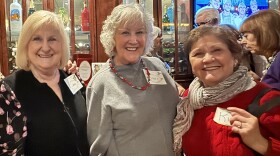Home-grown, native, seasonal... These buzz words are big in the food industry. But why should you care about whether an apple is local -- in picked from a farm up the road or grown in the United States?
One person who believes strongly that local makes a big difference is contributor Dave Kozlowski of Pinehold Gardens in Oak Creek. He says that local is a term that "means something to everybody, and it means something different oftentimes to everybody."
The standard definition of local is any product bought within a 100-mile radius of where it was made or harvested, according to Kozlowski, but he admits that definition can be limiting.
"You're just going to have to decide for yourselves and I actually think that works fine. That's really the heart and soul of the free market system - people are going to decide for themselves what they think is local," he says.
If you consider any products or produce made in the state of Wisconsin to be local, Kozlowski says you're in luck. "We're number three in the number of acres in organic production, number five in sales of organic products, number one in eggs and meat, and number one in organic produce."
"They say know your farmer, know your food - I think that's true."
More local produce is not just good for the consumer, he says, but also for the farmer. In 1990, farmers made 40 cents for every dollar a consumer spent on food - now it's less than seven cents on the dollar, Kozlowski explains.
It is not always easy to know what products are locally sourced. Kozlowski says a simple step to take is to just ask the produce manager at your grocery store or the restaurant waitstaff about where they source their ingredients.
"It's caveat emptor, right? Because the consumer has to do a little bit of research on this... But I think it's important to take that extra step because by doing that you're expressing your interest. And by expressing your interest, you're going to raise the interest of the owner of that grocery store or restaurant and they're going to pursue more organic local products."
Another fool-proof way to ensure you are getting local produce is through a Community Supported Agriculture program, or CSA. CSAs allow each member to own a share of the farm's produce and receive weekly packages of produce or products typically delivered to a drop site.
Kozlowski says that CSAs have been serving Wisconsin households for about 30 years and are starting to morph and change to better suit the individual needs of the customer.
Despite their history, there are only 23 CSAs serving Milwaukee and the surrounding areas.
"Is it more expensive (than buying groceries)? Over the long haul, no. What makes CSAs a little bit tricky (is that) the money is generally paid up front, so you are taking a bit of a risk," Kozlowski explains.
He also recommends going to farmer and community outreach events, such as the annual Local Food and Farmer Open House at the Urban Ecology Center.
"They say know your farmer, know your food - I think that's true," says Kozlowski. "Once you can know your farmer, I think that gives you a greater sense of security, integrity about the food, greater knowledge about where it's coming from, and just a greater sense of worth to the food that you're feeding."







